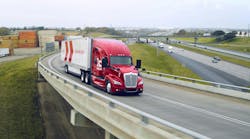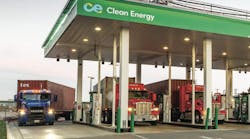Leasing enjoying fruits of the economy, but poised for challenges
Leasing companies are riding the current wave of economic prosperity to new levels of performance - developing new competencies and cultivating fertile new markets.
Last year, leasing grew slightly ahead of the economy at a 6% clip, estimates the Truck Renting and Leasing Assn. This defies the traditional logic - that leasing grows when capital markets dry up. But the market is not tight, it's awash in money and cheap financing.
Still, leasing accounts for just a shade under 40% of original equipment sales, meaning they have found ways to capture value beyond the asset.
Leasing companies know from past experience how quickly the tides can change. Just beneath the foaming surface are dangerous shoals, reflecting the pressures faced by their customers.
On the surface, today's booming economy sparked a record demand for trucks in 1998. The 208,000 heavy-duty units sold in the U.S. last year represented a double-edged sword for leasing. Leasing companies, like all others, had to wade through long factory lead times, often approaching 12 months. However, these long lead times translated to high rental-fleet utilization, as well as a number of lease extensions.
For 1999, leasing companies expect more of the same, at least early in the year. Leasing's performance is linked directly to the strength of its customer base - primarily those companies that operate trucks as an extension of their main business. While that business has changed, the 1997 Commodity Flow Survey Report reported that private fleets grew by 34.3% from 1993 to 1997. As America continues to develop a service-based economy, distributors are operating closer and closer to the final consumer.
Private fleets reflect these changes. Many companies have washed their hands of traditional in-house longhaul fleets. But taking their place is a wide array of diverse regional operations that travel fewer miles and often operate light- and medium-duty equipment.
Building new expertise One thing hasn't changed. That's the increasing service expectations to deliver timely, efficient, and cost-effective transportation. Just a few years ago, a 93% on-time delivery rate was considered outstanding. Today, anything less than 100% is often unacceptable.
The drive to reduce and control transportation costs has forced a number of businesses to re-evaluate the productivity of their fleets and take a fresh look at all the options that could enhance those expectations. Especially in light of today's corporate mandate to increase economic value-added.
The job of the leasing professional quite simply is to make the private fleet more competitive. Leasing allows a private fleet to avoid the capital equipment costs of buying vehicles. In addition, the leasing company's purchasing power may allow lower acquisition costs. Plus, leasing can provide a number of value-added functions such as maintenance, replacement vehicles, fueling, and tax administration.
In the past, leasing companies competed with each other on how well and at what price they could provide assets to the customer. Today, the competition has moved to a more knowledge-based playing field: how well those assets can be utilized.
This shifting competitive environment puts a premium on how well the leasing company listens to and understands the customer. What they're hearing is that many of their customers have become concerned about the challenges (environmental and labor) in vehicle maintenance.
In addition, many of these companies have invested a lot of time and money to develop a brand image. They recognize that their fleets must reflect that image. That goes a long way toward explaining why such firms are looking to leasing to absorb liability for government compliance, safety, and insurance.
The driver shortage remains a major concern. While turnover can reach upwards of 100-150% for common carriers, the number is much lower for private fleets, with averages ranging from 15-25%. However, more than 35% of private fleet managers surveyed in the National Private Truck Council's (NPTC) 1998 survey feel there is a "serious shortage of qualified drivers."
As if these challenges were not enough, cost is also a pressing concern. Today's private fleet is continually being benchmarked against alternatives such as outsourcing; this scrutiny will only grow more intense.
Many private fleet managers view outsourcing as a threat to their jobs. But leasing executives are selling just the opposite. "We view outsourcing as a promotion for a private fleet manager," says one. "In reality, we take over the mundane, freeing the fleet manager to think more strategically. Partnering with a lessor is not job risk - it's job security."
In addition, the current wave of consolidation in the business world presents its own unique challenges. Smaller companies are fighting to preserve their market niche without being swallowed by larger competitors. And the big boys are looking to seize new markets. For some lessors, consolidation is a threat because it wipes out existing and potential customers. Others view it as an opportunity because of the potential for more national account business.
Call it the age of the leasing company as consultant. In this role, it is incumbent upon leasing to be aware of the threats and opportunities private fleets face, and offer a variety of solutions. The measure of success will be whether leasing is able to solve problems their customers don't even know they have.
As if these challenges were not enough, leasing companies have taken a more aggressive approach to converting niche markets. For example, with the deregulation of utilities and continued belt-tightening at the local government level, municipalities and utilities are looking to leasing companies to bail them out of over-fleeted situations.
Another attractive growth opportunity includes the beverage and food service industries, which increasingly are looking to free up capital currently tied up in their fleets. In addition, construction and for-hire trucking companies with dedicated runs are becoming subject to the same customer service expectations as private fleets and should therefore be open to leasing.
Other leasing firms are looking for new growth beyond national borders. The successful leasing company of the 21st century may well need to be able to service the needs of private fleets operating across international borders and in other parts of the world.
The designer lease As the leasing industry assembles its expertise in diverse vocations and applications, customers are increasingly expecting to be able to pick and choose from a wide array of unbundled leasing services. Companies are supplementing the "commodity" full-service lease with a range of value-added services.
Take mass customization another step further and leasing companies are competing in the high-wire realm of third-party logistics. Outsourced transportation thus represents a potential area for new growth - provided it's properly understood and delivered.
"Rather than developing one-size-fits-all solutions to address customer needs, we take the time to understand the unique challenges our customers face," says one leasing executive. "It's no surprise that these custom-engineered solutions also prove to be the most cost-effective."
Plus, leasing companies continue to invest in enhancing the strength or volume of their distribution points as part of an effort to deliver more consistent quality. Toward that end, National Truck Leasing System announced a new and revolutionary guarantee: Leasing companies affiliating with NationaLease will get their money back if not fully satisfied after one year.
Across the board, leasing companies are rising to the business challenges by incorporating new information technologies into their service portfolios: Internet-based emergency services software; improved centralized billing and reports; and onboard computers and communication.
It's not a business for the faint of heart.


